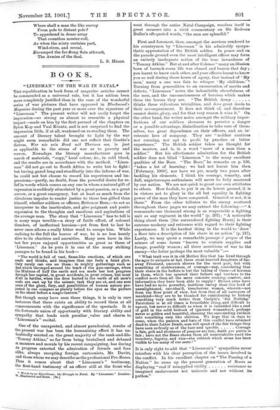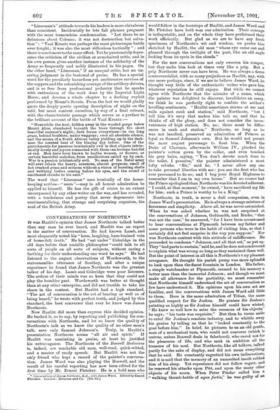BOOKS.
" LINESMAN " ON THE WAR IN NATAL.*
THE republication in book form of magazine articles cannot be commended as a universal rule, but it has seldom been more completely justified than in the case of the wonderful series of war pictures that have appeared in Blackwood's Magazine during the past year or more over the signature of
"Linesman." The present writer will not easily forget the impression—so strong as almost to resemble a physical impact—made on him by the first perusal of the chapters on Spion Kop and Vaal Krantz, and is not surprised to find the impression little, if at all, weakened on re-reading them. The
amount Of literary talent brought to• light by the war might seem remarkable did one not reflect that Goethe's dictum, Wer nie sein Brod mit Thronem ass, is just as applicable to the stress of war as to poverty and sorrow. Nowadays the literary manufacturer goes in
search of materials, "copy," local colour, &c., in cold blood, and the results are in accordance with the method. "Lines- man" did not go out to South Africa to write but to fight ; but having gazed long and steadfastly into the inferno of war, be could not but choose to record his experiences and im- pressions,—partly, no doubt, from the powerful desire for re- lief in words which comes on any one in whom a natural gift of
expression is suddenly stimulated by a great passion, or a great sorrow, or a great emergency, but at least as much from the dirivahxyas impulse to render justice to those less gifted than himself, whether soldiers or officers, Briton or Boer,—to act as
interpreter to the inarticulate, and give poignant and poetic expression to the thoughts and emotions and aspirations of the average man The story that "Linesman" has to tell is .1n many ways terrible—a story of futile effort, of colossal blunders, of ineffectual heroism—yet from first to last he sever once allows a really bitter word to escape him. While realising to the full the horror of war, he is no less keenly /dive to its charities and amenities. Many men have in the last few years enjoyed opportunities as great as those of 'Linesman." As he puts it in one of the many striking passages to be found in his book-
" The world is full of vast, flame-like emotions, of which one teads and thinks, and imagines that one feels a faint glow. Only rarely can one 1166 them : in mighty gatherings such as that which thronged around the track of the gun-carriage, when the Mistress of half the earth and sea made her last progress through her capital, in great accidents, in great crimes, but moat 3f all in battles, when the fires buried in the earth of all men's souls are cast up by the seismic task they are at, and one sees some of the glory, fury, and possibilities of human nature pro- iected In one compass as plainly before the eyes as the picture an the sheet before a magic-lantern."
But though many have seen these things, it is only in. rare
instances that there exists an ability to record them at all commensurate with the significance of the spectacle. It is the fortunate union of opportunity with literary ability and sympathy that lends such peculiar _value and charm to "Linesman's " recital.
One of the unexpected, and almost paradoxical, results of the present war has been the humanising effect it has un- doubtedly exerted on the great majority of the rank-and-file.
Tommy Atkins," so far from being brutalised and debased at manners and morals by his recent campaigning, has during Its progress extorted the admiration of friends and foes alike, always excepting foreign cartoonists, Mr. Devitt, and those whom we may describe as the professional Pro-Boers. Thus it comes about that " Linesman's " testimony, the first-hand testimony of an officer still at the front who Wordd by an Eyewitness : the Struggle in Natal. By " Linesman." London: %V.-Blackwood and Sons. Ps.]
went through the entire Natal Campaign, resolves itself in great measure into a vivid commentary on Sir Beavers Buller's oft-quoted words, "the men are splendid."
First and foremost, then, amongst the services rendered to his countrymen by " Linesman " is his admirably sympa- thetic a.ppreoiation of the British soldier. In peace and on the parade ground even the most intelligent officer may form an entirely inadequate notion of the true inwardness of "Tommy Atkins." But at and after Colenso " many an illusion born of barrack-room life was chased and beaten that day ; you learnt to know each other, and your officers learnt to know you so well during those hours of agony, that instead of My
men,' many a one was fain to whisper 'My children.'"
Turning from generalities to an enumeration of merits and defects, " Linesman " notes the indomitable cheerfulness of the men, and the unconsciousness of heroism which makes them the heroes they are. "The British Army thinks these ridiculous trivialities, and does great deeds to their accompaniment. It does not think of, and therefore cannot desire, glory, and for that very reason it wins it." On the other hand, the writer notes amongst the military imper- fections of our soldiers slowness to perceive a danger or a possible advantage, disinclination to take care of them selves, too great dependence on their officers, and an in- veterate love of company. They are "neither cautious nor cunning, nor apt to profit by practice or bitter experience." The British soldier takes no thought for the morrow, and is, in a word "more of a man than a, soldier." But his affectionate admiration for the British soldier does not blind " Linesman " to the many excellent qualities of the Boer. "The Boer," he remarks on p. 136, "takes a lot of learning : we had not learnt him then [February, 1900], nor have we yet, nearly two years after tackling his elements. I think his courage, tenacity, and dull, unpicturesque enthusiasm will never be fully mastered by our nation. We are not quick to grant our own attributes to others. How foolish, to put it on its lowest ground, it is in victors not to glory in the all but equality in fighting power of the man they have conquered. Granted or not, it is there." From the other tributes to the enemy scattered
throughout these pages we may extract the following :—" A. commando one thousand strong is as respectable a fighting
unit as any regiment in the world" (p. 207); "A noticeable thing about them [the surrendered fighting Boers] is their extreme modesty and reticence with regard to their fighting experiences. It is the hardest thing in the world to 'draw' a Boer into a description of his share in an action" (p. 217).
Lastly, we may quote a remarkable passage a propos of the seizure of some farms "known to contain supplies and
forage, possibly women; all three munitions of war to the enemy—the latter perhaps the most valuable ":—
"What trait was it in old Mother Eve that has lived through the ages to animate at last these stout-hearted daughters of far- away Friesland, uncouth shrews for the most part, but with something of stubbornness, of courage—nay, considering that their share in the buffets is but the taking of them—of heroism in them, which has spurred their fathers and brothers to the conflict more than all the mere concrete cooking, comfort, and information they have been able to supply ? British arms have have had no more powerful, insidious enemy than this herd of unenlightened, one-idea'd, treacherous women, wherein—not from the Boer point of view, but from that of all surveyors of mankind—they are to be thanked for contributing to history something very much better than Carlyle's flat Nothing.' Patriotism is at all times 'a formidable thing, and difficult to uproot, but never so difficult as when it is imbedded like a reef of gold in the solid bedrock of ignorant womanhood, perhaps never so golden and beautiful, shaming the surrounding rubbish into something very like oblivion. We hope that in days to come, when the passion and hate of this conflict have returned dead to their father Death, men will speak of the fair things they
have seen as freely as of the base and ignoble Courage is fair, grit and stoutness of purpose are fair, death pro patria is fair ; have not the Boers shown them all unmistakable amid the treachery, bigotry, and vice—the rubbish which alone has been visible to too many of our seers ?"
It is only right to add that " Linesman's " sympathies never interfere with his clear perception of the issues involved in the conflict. In his excellent chapter on "The Passing of a_ Nation " he sums up the present generation of Boers as
displaying "real if misapplied virility resistance to imagined enslavement not unheroic and not without its pathos." "Linesman's" attitude towards his leaders is more chivalrous than consistent. Incidentally he lets fall phrases pregnant with the most tremendous condemnation. "Let there be no delusions about Colenso ; it was not destruction but salva- tion" : "Vaal Krantz was perhaps the most picturesque battle ever fought; it was also the most ridiculous tactically " : and there is much more to the same effect. Yet he passionately depre- cates the criticism of the civilian or armchaired critic, and in his own person gives another instance of the solidarity of the Army so frequently and nobly illustrated in his pages. On the other hand, "Linesman," if an unequal critic, has an un- erring judgment in the bestowal of praise. He has a special word for the peculiarly hazardous yet unobtrusive services of the sappers and the astonishing courage of the artillery-drivers,
and is BO free from professional pedantry that he speaks with enthusiasm of the work done by the Imperial Light
Horse, and devotes a whole chapter to a dashing exploit performed by Menne's Scouts. From the last we would gladly quote the deeply poetic opening description of night on the veld, but must content ourselves, by way of a final extract, with the characteristic passage which serves as a preface to the brilliant account of the battle of Vaal Krantz
Meanwhile the host, hidden away in the wooded gorge below Mount Alice, slumbered beneath the trees through the short beautiful summer's night; dark forms everywhere—in the long grass, behind boulders, under waggons; over all absolute silence, and the aroma of a South African valley yielding up in the dark- ness the scented heat of the blazing day before. One of the punishments for passions intrinsically evil is that objects intrin- sically lovely and joyous connected with them can become hateful or sad. Men have been known to loathe women, or flowers, or certain beautiful melodies, from recollections called up by each. War is a passion intrinsically evil. No man of the Natal army will ever inhale the heavy, sensuous, almost gorgeous. smell of hot crushed grass and mimosa without a vision of bursting shells and writhing bodies coming before his eyes, and the sound of smothered shrieks to his ears."
The word that " Linesman " uses ironically of the home- keeping scribes—" seers "—may in all honest admiration be
applied to himself. He has the gift of vision to an extent unsurpassed by any other writer on the war, and has revealed, with a tenderness and poetry that never degenerate into sentimentalising, that strange and surprising organism, the soul of the British Army.











































 Previous page
Previous page